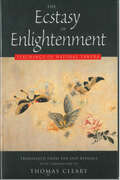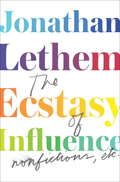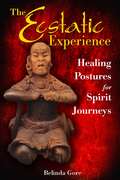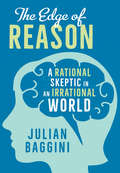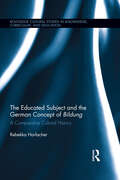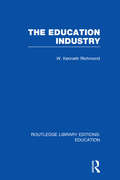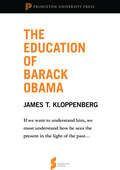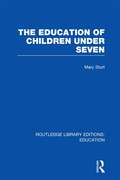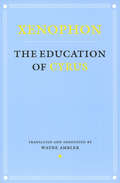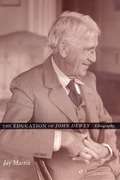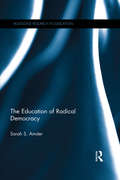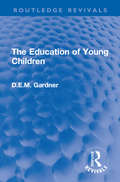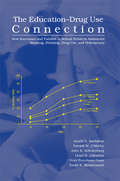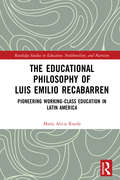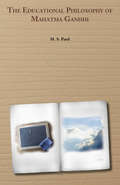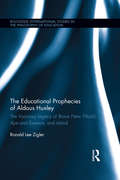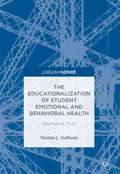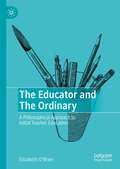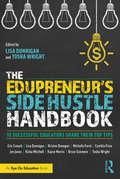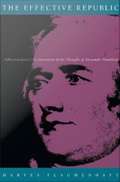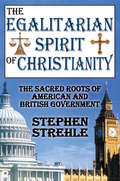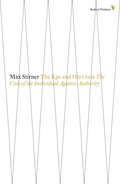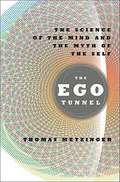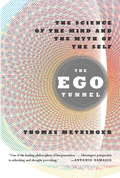- Table View
- List View
The Ecstasy of Enlightenment: Teachings of Natural Tantra
by Thomas ClearyThe Ecstasy of Enlightenment is an inside look at the spiritual world of Tantra--one of the most sophisticated, alluring, and controversial forms of Buddhism. Cleary unlocks the mysteries of the Carya-Giti, a collections of teachings by more than twenty famous Siddhas, or Tantric adepts, who lived during the illustrius Pala dynasty of old Bengal. These teachings emanate from one of the most dynamic sources of international Buddhism, at the height of its religious development, and as such, they are completely nonsectarian. Particularly noteworth is Cleary's demonstration of the parallels between Tantric Buddhism in Old Bengal and the original Zen Buddhism of China.
The Ecstasy of Influence
by Jonathan LethemWhat's a novelist supposed to do with contemporary culture? And what's contemporary culture supposed to do with novelists? InThe Ecstasy of Influence, Jonathan Lethem, tangling with what he calls the 'white elephant' role of the writer as public intellectual, arrives at an astonishing range of answers. A constellation of previously published pieces and new essays as provocative and idiosyncratic as any he's written, this volume sheds light on an array of topics from sex in cinema to drugs, graffiti, Bob Dylan, cyberculture, 9/11, book touring and Marlon Brando. Then there are investigations of a shelf's worth of his literary models and contemporaries: Norman Mailer, Philip K. Dick, Bret Easton Ellis, James Wood, and others. And, writing about Brooklyn, his father, and his sojourn through two decades of writing, one of the greats of contemporary American literature sheds an equally strong light on himself. Funny and unfettered,The Ecstasy of Influencesimmers with direct challenges to conventional wisdom and deep insights into the kaleidoscopic nature of artistic vision, the primacy of the writer in the cultural marketplace, and the way the author's own experiences have fuelled his creative passions.
The Ecstatic Experience: Healing Postures for Spirit Journeys
by Belinda GoreTrance-inducing postures for shamanic journeying, initiation, healing, divination, and transformation of the soul • Provides practices from Mayan, Egyptian, African, Native American, Sumerian, and other ancient and indigenous traditions • Shows how these practices can detoxify the energy body The human need for ecstasy--the ability to be free of the limitations of ordinary consciousness--is as imperative as the need for food. Renowned anthropologist Felicitas Goodman claimed that being deprived of ecstasy was the fundamental cause of all forms of addiction. Indigenous cultures and the civilizations of antiquity were aware of this and developed specific rituals to induce and channel trance energies to detoxify and nourish the subtle body in order to experience the ecstatic reality that gives life to matter. The body postures seen in ancient art from Mayan, Egyptian, African, Native American, Sumerian, and other ancient and indigenous traditions are a doorway to inducing this kind of ecstatic trance. People who assume these postures in a ritual context are able to experience expanded and transformative states of consciousness. Following up on the groundbreaking introduction of this practice in her first book, Ecstatic Body Postures, Belinda Gore provides a new series of 20 sacred postures and exercises that allow for a deeper understanding and utilization of these shamanic practices. She shows how to use the energy awakened by these practices for healing, shapeshifting, initiations into the mysteries of death and rebirth, divination, spirit journeying, and restoring balance to the cosmic patterns disrupted by destructive human activity.
The Edge of Reason: A Rational Skeptic in an Irrational World
by Julian BagginiAn urgent defense of reason, the essential method for resolving—or even discussing—divisive issues: &“A timely masterpiece.&”—Patricia S. Churchland, author of Touching a Nerve Reason, long held as the highest human achievement, is under siege. According to Aristotle, the capacity for reason sets us apart from other animals, yet today it has ceased to be a universally admired faculty. Rationality and reason have become political, disputed concepts, subject to easy dismissal. Julian Baggini argues eloquently that we must recover our reason and reassess its proper place, neither too highly exalted nor completely maligned. Rationality does not require a cold, sterile worldview—it simply involves the application of critical thinking wherever thinking is needed. Addressing such major areas of debate as religion, science, politics, psychology, and economics, the author calls for commitment to the notion of a &“community of reason,&” where disagreements are settled by debate and discussion, not brute force or political power. Baggini&’s insightful book celebrates the power of reason, our best hope—indeed our only hope—for dealing with the intractable quagmires of our time. &“The toxic gloating of &‘gut feelings,&’ hateful politics and heart-over-head attacks on good sense urgently need an antidote. Baggini has risen to the occasion…compelling.&”—Patricia S. Churchland, author of Conscience: The Origins of Moral Intuition
The Educated Subject and the German Concept of Bildung: A Comparative Cultural History (Routledge Cultural Studies in Knowledge, Curriculum, and Education #2)
by Rebekka HorlacherGerman education plays a huge role in the development of education sciences and modern universities internationally. It is influenced by the educational concept of Bildung, which defines Germany ‘s theoretical and curricular ventures. This concept is famously untranslatable into other languages and is often misinterpreted as education, instruction, training, upbringing and other terms which don’t encompass its cultural ambitions. Despite this hurdle, Bildung is now being recognized in current discussions of education issues such as standardization, teaching to the test, evidence-based policy and high stakes testing. This volume clears up the confusion and misunderstandings surrounding Bildung by examining the origins of the concept and how it has been applied throughout history. It paves the way for educators to fully understand and benefit from this model and all it has to offer.
The Education Industry (Routledge Library Editions: Education)
by W Kenneth RichmondIn one sense, education was always a service industry. This book examines the quality as well as the quantity of contemporary education as it answers the following questions: Are we getting value for money? What makes a good teacher? What sort of education do we want? In the UK in the twentieth century education grew while national income did not. Britain devoted more of its resources to education than any other European nation and yet the UK had the largest proportion of children leaving school at 15 and spent more on each university place than the USA. The author argues that far too little attention was paid to cost-effectiveness analysis and planning. He examines Swedish and American examples and concludes that we must seek and employ the common features of modern management – network analysis, operational research and organizational theory. He also argues that traditional education has to come to terms with the mounting pressures of new curricula and new media.
The Education of Barack Obama: From Reading Obama (Princeton Shorts #7)
by James T. KloppenbergIf you really want to know what makes Barack Obama tick, you need to understand his education. James T. Kloppenberg explains the rich American intellectual tradition that shapes Obama's beliefs and influences his actions--particularly his aversion to absolutes and his commitment to compromise. This look at Obama's education is a deeply rewarding education in itself. Princeton Shorts are brief selections taken from influential Princeton University Press books and produced exclusively in ebook format. Providing unmatched insight into important contemporary issues or timeless passages from classic works of the past, Princeton Shorts enable you to be an instant expert in a world where information is everywhere but quality is at a premium.
The Education of Children Under Seven (Routledge Library Editions: Education)
by Mary SturtThis book does not cover the whole field of Infants’ Teaching but is concerned mainly with general principles and matters which are open to the non-specialist. Some technical subjects such as Physical Education have been omitted but nonetheless the volume provides a thorough (if somewhat dated) introduction to early years education in the first half of the twentieth century.
The Education of Cyrus
by Xenophon Wayne AmblerXenophon's masterpiece, The Education of Cyrus, is a work that was admired by Machiavelli for its lessons on leadership. Also known as the Cyropaedia, this philosophical novel is loosely based on the accomplishments of Cyrus the Great, founder of the vast Persian Empire that later became the archrival of the Greeks in the classical age. It offers an extraordinary portrait of political ambition, talent, and their ultimate limits. The writings of Xenophon are increasingly recognized as important works of political philosophy. In The Education of Cyrus, Xenophon confronts the vexing problem of political instability by exploring the character and behavior of the ruler. Impressive though his successes are, however, Cyrus is also examined in the larger human context, in which love, honor, greed, revenge, folly, piety, and the search for wisdom all have important parts to play. Wayne Ambler's translation captures the charm and drama of the work while also achieving great accuracy. His introduction, annotations, and glossary help the reader to appreciate both the engaging story itself and the volume's contributions to philosophy.
The Education of John Dewey: A Biography
by Jay MartinBased on original sources, notably the vast collection of unpublished papers in the Center for Dewey Studies, this book tells the full story of the life and times of the eminent American philosopher, pragmatist, education reformer, and man of letters. His philosophy, Pragmatism, has been the distinctive American philosophy during the last fifty years and his work on education is still influential today.
The Education of John Dewey: A Biography
by Jay MartinDuring John Dewey's lifetime (1859-1952), one public opinion poll after another revealed that he was esteemed to be one of the ten most important thinkers in American history. His body of thought, conventionally identified by the shorthand word "Pragmatism," has been the distinctive American philosophy of the last fifty years. His work on education is famous worldwide and is still influential today, anticipating as it did the ascendance in contemporary American pedagogy of multiculturalism and independent thinking. His University of Chicago Laboratory School (founded in 1896) thrives still and is a model for schools worldwide, especially in emerging democracies. But how was this lifetime of thought enmeshed in Dewey's emotional experience, in his joys and sorrows as son and brother, husband and father, and in his political activism and spirituality? Acclaimed biographer Jay Martin recaptures the unity of Dewey's life and work, tracing important themes through the philosopher's childhood years, family history, religious experience, and influential friendships. Based on original sources, notably the vast collection of unpublished papers in the Center for Dewey Studies, this book tells the full story, for the first time, of the life and times of the eminent American philosopher, pragmatist, education reformer, and man of letters. In particular, The Education of John Dewey highlights the importance of the women in Dewey's life, especially his mother, wife, and daughters, but also others, including the reformer Jane Addams and the novelist Anzia Yezierska. A fitting tribute to a master thinker, Martin has rendered a tour de force portrait of a philosopher and social activist in full, seamlessly reintegrating Dewey's thought into both his personal life and the broader historical themes of his time.
The Education of Radical Democracy (Routledge Research in Education)
by Sarah S. AmslerThe Education of Radical Democracy explores why radical democracy is so necessary, difficult, and possible and why it is important to understand it as an educative activity . The book draws on critical social theory and critical pedagogy to explain what enables and sustains work for radical democratization, and considers how we can begin such work in neoliberal societies today. Exploring examples of projects from the nineteenth century to the present day, the book sheds light on a wealth of critical tools, research studies, theoretical concepts and practical methods. It offers a critical reading of the ‘crisis of hope’ in neoliberal capitalist societies, focusing on the problem of the ‘contraction of possibilities’ for democratic agency, resistance to domination, and practices of freedom. It argues that radically democratic thinking, practice, and forms of social organization are vital for countering and overcoming systemic hegemonies and that these can be learned and cultivated. This book will be of interest to academics, practitioners, researchers, and students in education and critical theory, and to those interested in the sociology, philosophy and politics of hope. It also invites new dialogues between theorists of neoliberal power and political possibility, those engaged in projects for radical democratization, and teachers in formal and informal educational settings.
The Education of Young Children (Routledge Revivals)
by D.E.M. GardnerFirst published in 1956, The Education of Young Children is focused on presenting the psychological needs of children within education, following several talks given by the author at conferences for teachers of young children. The book highlights the importance of meeting all aspects of a child’s needs. It demonstrates that physical, emotional, social, and intellectual needs are all intrinsically connected and fundamental to education and development. It also puts forward the significance of Nursery Schools and the training given to Nursery School teachers, as well as the influence of Nursery Schools on Infant Schools. The Education of Young Children will appeal to those with an interest in the history and psychology of education.
The Education-Drug Use Connection: How Successes and Failures in School Relate to Adolescent Smoking, Drinking, Drug Use, and Delinquency
by Jerald G. Bachman Patrick M. O'Malley John E. Schulenberg Lloyd D. Johnston Peter Freedman-Doan Emily E. MessersmithDoes success in school protect teenagers from drug use? Does drug use impair scholastic success? This book tackles a key issue in adolescent development and health - the education-drug use connection. The authors examine the links and likely causal connections between educational experiences, delinquent behavior, and adolescent use of tobacco, alco
The Educational Philosophy of Luis Emilio Recabarren: Pioneering Working-Class Education in Latin America (Routledge Studies in Education, Neoliberalism, and Marxism)
by María Alicia RuedaThis text offers a unique philosophical and historical inquiry into the educational vision of Luis Emilio Recabarren, and his pivotal role in securing independent education for Chile’s working classes in the early 20th century. Through close analysis of the textual archives and press writings, The Educational Philosophy of Luis Emilio Recabarren offers comprehensive insight into Recabarren’s belief in education as essential to the empowerment, emancipation, and political independence of the working class, and emphasises the importance he placed on the education of workers through experiential learning in their organizations and press. By situating his work amongst broader political and educational movements occurring in Latin America in an era of imperialism, the text also demonstrates the progressive nature of Recabarren’s work and maps the development of his philosophy amid Socialist, Marxist, and Communist movements. Making an important contribution to our understanding of the aims and value of adult education in light of neoliberalism today, this text will be of interest to scholars, researchers, activists, and post-graduate students with an interest in education, social movements, and Latin America. The text also addresses key issues raised in studies of Recabarren and the history of education in Chile.
The Educational Philosophy of Mahatma Gandhi
by M. S. Patel“By education, I mean an all-round drawing out of the best in child and man—body, mind and spirit. Literacy is not the end of education nor even the beginning. It is one of the means whereby man and woman can be educated. Literacy in itself is no education.” … “the aim of education should be to develop to the full the potentialities of every child at school, in accord always with the general good of the community of which he is a member.” M. K. Gandhi
The Educational Prophecies of Aldous Huxley: The Visionary Legacy of Brave New World, Ape and Essence and Island (Routledge International Studies in the Philosophy of Education)
by Ronald ZiglerThe visionary legacy of Aldous Huxley is as relevant today as ever. Huxley possessed a sober understanding of the human condition as well as an inspired vision of the human potential. This volume presents an interdisciplinary examination and appreciation of Aldous Huxley’s three visionary novels – Brave New World (1932), Ape and Essence (1948), and Island (1962) – to reveal the extent to which Huxley’s prognoses into our possible futures was prophetic. The author assesses each novel to reveal the foresights that define our current educational, social, religious, political, and economic institutions, while also exposing our conflicts within those institutions. This volume examines the educational, cultural and technological changes that have shaped our society since Huxley’s work, with special reference to the enduring legacy of educational philosopher John Dewey. It offers profound insights into the educational forces and moral foundations of our society that shape us, both inside and outside of our schools. It is the first of its kind to focus exclusively on all three of Huxley’s visionary novels and detail their relevance to our world today.
The Educationalization of Student Emotional and Behavioral Health: Alternative Truth
by Teresa L. SullivanThis book examines the current political, social, and economic positions that push the responsibility for the emotional health of students onto schools. The context of recent education reform asks schools to mitigate adverse emotional health of students by developing and implementing broad programming, curriculum, and policies immersed in cognitive behavioral approaches. The design plan is intended to build resilience and develop strategies in students that will enable them to succeed despite adverse structural conditions. The swindle of education reform is that it deflects and blames families, youth, and the school system for the social ills of society. From the perspective of a thirty year Massachusetts educator and high school principal emerges an alternative reality that not only challenges decades of education reform entrenched in victim blaming but also exposes a serious responsibility gap.
The Educator and The Ordinary: A Philosophical Approach to Initial Teacher Education
by Elizabeth O'BrienThis book creates a unique discursive environment to consider how initial teacher education can support student teachers in practical and personal senses, in what they can do and who they are. What is it to care? To develop our voice? To educate in beautifully risky ways? Engaging with the philosophy of Stanley Cavell, Gert Biesta and Nel Noddings, central capabilities of the educator are suggested: Acknowledgement, Autobiography, Imagination, Interruption, Attention and Uncertainty, culminating in the essential, unifying capability of The Ordinary, underpinned by Complexity and Hope.This book will appeal to those interested and engaged in initial teacher education, professional development and support from early years to higher education and practicing educators. It aims to enrich theoretical as well as practical discussion, to influence how we live, how we think, and how we treat each other.
The Edupreneur's Side Hustle Handbook: 10 Successful Educators Share Their Top Tips
by Lisa Dunnigan Tosha WrightFind out how you can use your talents as an educator to make extra money on the side! In this helpful book, top Instagram influencers share how they’ve had success with selling lesson plans, handouts, t-shirts, and more, while maintaining careers as teachers and school leaders. You’ll hear from these inspiring educators: Lisa Dunnigan and Tosha Wright @thewrightstuffchics Jen Jones @hellojenjones Michelle Ferré @pocketfulofprimary Kisha Mitchell @sweetteaandsunshinepodcast Bryce Sizemore @theteachingtexan Kristen Donegan @easyteachingtools Cynthia Frias @followsocialone Kayse Morris @kaysemorris Eric Crouch @adventureswithmrc If you’ve always dreamed of having a side hustle but weren’t sure you had the time or the know-how, this is the book for you. Each chapter offers tons of practical tips to help you get started, along with humorous anecdotes and words of wisdom to keep you motivated on your journey.
The Effective Republic: Administration and Constitution in the Thought of Alexander Hamilton
by Harvey FlaumenhaftThe United States has been distinguished among free governments as a "presidential" republic. In The Effective Republic, Harvey Flaumenhaft shows how the study of Alexander Hamilton's political thought opens the way to understanding the nature of this republic and the reasons for its development. Although Hamilton exterted an extraordinary influence on American institutions, his contribution and the thinking behind it often have been obscured and misconstrued by piecemeal approaches to his voluminous writings. Here, Flaumenhaft draws upon more than two dozen volumes of Hamilton's papers to produce a comprehensive account of his thought on the principles of politics--the account which Hamilton himself hoped to give in a multivolume treatise, but died before producing. Beginning with a discussion of the place of general principles in Hamilton's thought, The Effective Republic proceeds to his views on popular representation as a safeguard of individual liberty. Flaumenhaft then elaborates on Hamilton's thinking about efficacious administration, especially how the President and Senate meet the requirements of unity and duration in a republic, and on the importance of an independent judiciary for constitutional integrity. What emerges clearly as Hamilton's chief concern is the need to make government not only safe but effective--hindered from doing harm by its popular base, but also, through the differentiation of administrative powers and tasks, capable of doing good. Interpreting, linking, and, and arranging Hamilton's words, Flaumenhaft allows Hamilton to speak for himself, to explain his benificiaries his vision of what the republican experiment needed in order to succeed.
The Egalitarian Spirit of Christianity: The Sacred Roots of American and British Government
by Stephen StrehleReligion no longer plays a dominant role in the everyday consciousness of modern Western society. Few people recognize the underlying role of religious beliefs and practices in their life choices. Stephen Strehle shows the significance and ongoing influence of religion in contemporary life by revealing the sacred roots of modern political ideas in the sixteenth and seventeenth centuries. He discusses the role of the church in government, probing into the sources of democratic, federal, and egalitarian ideas on the continent of Europe during the Reformation. The separation of church and state in America and the diminished power of the Church of England were the culmination of secular forces evolving since the Enlightenment. This secular view of life represents the basic mentality of the culture and the government in general; yet there is much to contradict it. The last half of the twentieth century witnessed a surge of grassroots movements from all sides of the political/religious spectrum. These included the civil rights movement of the 1960s and the Moral Majority of the 1980s, both of which provided an effective challenge to a simple separation of the two realms. Strehle explores some of the most cherished political ideals of modern society, including equality and democracy, liberty and natural rights, progress and capitalism, federalism and mixed government. He does not dismiss the vital contribution of other possible sources of inspiration from the world of religion or undermine the well-established place of &“secular&” sources. But he does show that certain ideas associated with the religious community have left an indelible mark upon significant aspects of the emerging American landscape.
The Ego And His Own
by Max StirnerThe Ego and His Own, the seminal defence of individualism, coloured the thinking of Friedrich Nietzsche, Max Ernst, Henrik Ibsen and Victor Serge, among many others, some of whom would vigorously deny any such influence in later years. Less reticent was Marcel Duchamp, who described Max Stirner as the philosopher most important to his work.Challenging the religious, philosophical and political constraints on personal freedom, Stirner criticizes all doctrines and beliefs that place the interests of God, the state, humanity or society over those of the individual. Anticipating the later work of nihilists, existentialists, and anarchists, The Ego and His Own upholds personal autonomy against all that might oppose it.
The Ego Tunnel: The Science of the Mind and the Myth of the Self
by Thomas MetzingerWe're used to thinking about the self as an independent entity, something that we either have or are. In The Ego Tunnel, philosopher Thomas Metzinger claims otherwise: No such thing as a self exists. The conscious self is the content of a model created by our brainpan internal image, but one we cannot experiences image. Everything we experience is "a virtual self in a virtual reality." But if the self is not "real," why and how did it evolve? How does the brain construct it? Do we still have souls, free will, personal autonomy, or moral accountability? In a time when the science of cognition is becoming as controversial as evolution, The Ego Tunnel provides a stunningly original take on the mystery of the mind.
The Ego Tunnel: The Science of the Mind and the Myth of the Self
by Thomas MetzingerWe’re used to thinking about the self as an independent entity, something that we either have or are. InThe Ego Tunnel, philosopher Thomas Metzinger claims otherwise: No such thing as aselfexists. The conscious self is the content of a model created by our brain-an internal image, but one we cannot experienceasan image. Everything we experience is "a virtual self in a virtual reality. ” But if the self is not "real,” why and how did it evolve? How does the brain construct it? Do we still have souls, free will, personal autonomy, or moral accountability? In a time when the science of cognition is becoming as controversial as evolution,The Ego Tunnelprovides a stunningly original take on the mystery of the mind.
